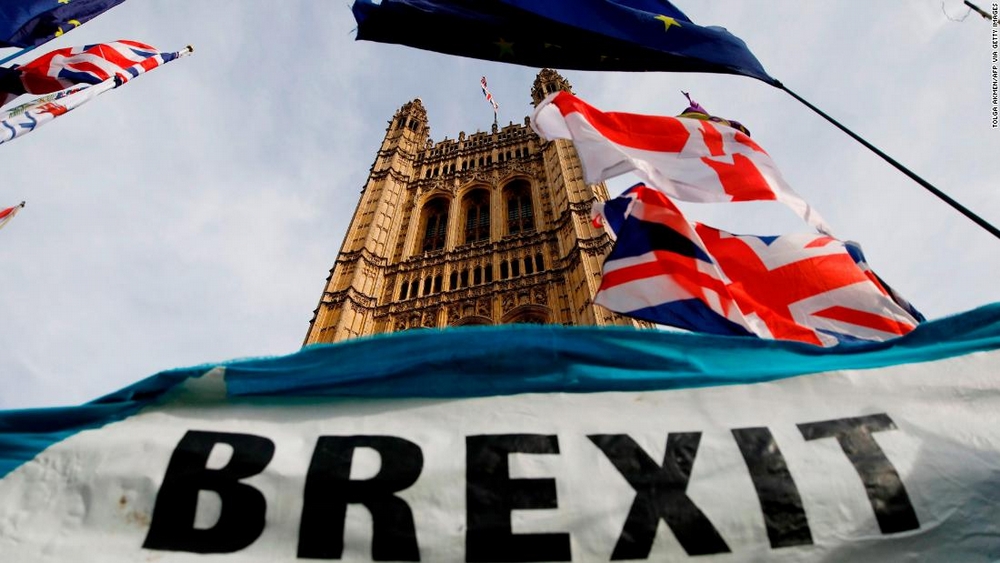

Different Scenarios that Credit Traders are Considering as Brexit Uncertainty Lingers On
Source: Bloomberg
Gilts losing their protective buffer, the hard Brexit menace and even socialism with echoes of the 1970s. Debt investors are bracing for all of these scenarios — and more — as the U.K.’s second election in less than three years draws nearer.
There’s an array of hard-to-price outcomes. The incumbent Tory party could secure a majority, Labour could still topple it, or there might be a hung Parliament with no working coalition. Hanging in the balance is the divorce from the European Union that’s forced out the last two prime ministers, spurring pound volatility along the way.
It was all going so well. Barring upsets, credit managers look ready to close out a bumper year thanks to monetary stimulus and continued economic growth. It’s the best year for investment-grade corporate bonds in euros in six, and since 2016 for those in pounds. So-called CoCos dominated by British banks have trounced plain-vanilla peers, handing returns of 15%.
War Games
There are only two credible scenarios for UBS Global Wealth’s CIO for: a Conservative Party majority and a parliament lacking single-party majority. Both would keep the risk of a no-deal Brexit to a minimum. “Deal uncertainty will subside in the short term and other things being equal, this should support riskier assets,” said Dean Turner, an economist at UBS Global Wealth Management’s chief investment office. “Sterling credit falls into that bucket.”
The credit strategists say the current spread level over euro investment-grade bonds “looks fair given the duration differences in the index.”
A Bloomberg Barclays index of sterling corporate bonds with a modified duration of 8.6 years is quoted at a spread of 139 basis points compared with some 99 basis points for the 5.3-year euro tracker.
WTO Scenario
A Conservative majority would also prompt concerns about the trading relationship with the EU — potentially raising the prospect of the U.K. falling back on World Trade Organization rules at the end of the transition period on Dec. 31, 2020, according to AXA Investment Managers.
Under such a scenario, “you will see the market pricing in again a downside in growth prospects, inevitably affecting spreads as well,” said Greg Venizelos, a London-based credit strategist. This could lead to a 40 to 50-basis-point widening, he said.
Nationalization Paradox
While most of her peers are dreading the prospect of a Labour government taking over swathes of British industry, Sharon Vieten is sanguine. With perceived state support, bonds of utilities that currently trade at a spread of around 140 basis points relative to government debt would converge closer to gilts. “If nationalization goes ahead you may have the additional upside of government ownership,” said Vieten, a credit analyst at Columbia Threadneedle.
The firm prefers bonds issued by regulated entities and those with lower cash prices that would potentially suffer the least in a nationalization.
Banking Dominance
Financial borrowers dominate the sterling corporate bond market
CoCo Conundrum
In addition to utilities, bonds from financial institutions known as contingent convertibles are the most vulnerable to election noise, according to M&G Investments. CoCos from the likes of Barclays and Nationwide Building Society fluctuated amid Brexit headlines last month. Almost half of the sterling investment-grade credit index is made up of financial institutions, most of which are U.K-based.
This can be ominous from a volatility standpoint as “binary swings in U.K. bank credit spreads are set to continue over the course of the election campaign,” said Ben Lord, a fund manager at M&G’s wholesale fixed income team.
Gilt Haven or Hell
At TwentyFour Asset Management, money managers are concerned government debt could start behaving more like bonds to be shunned in a political upheaval instead of a haven trade.
“Gilts are a classic hedge for credit investors and we’re not as confident as usual they’ll behave the way we expect,” said Gordon Shannon, a portfolio manager at TwentyFour. Some global funds at the firm have allocated more to U.S. Treasuries and reduced gilt exposure for this reason, he said.


